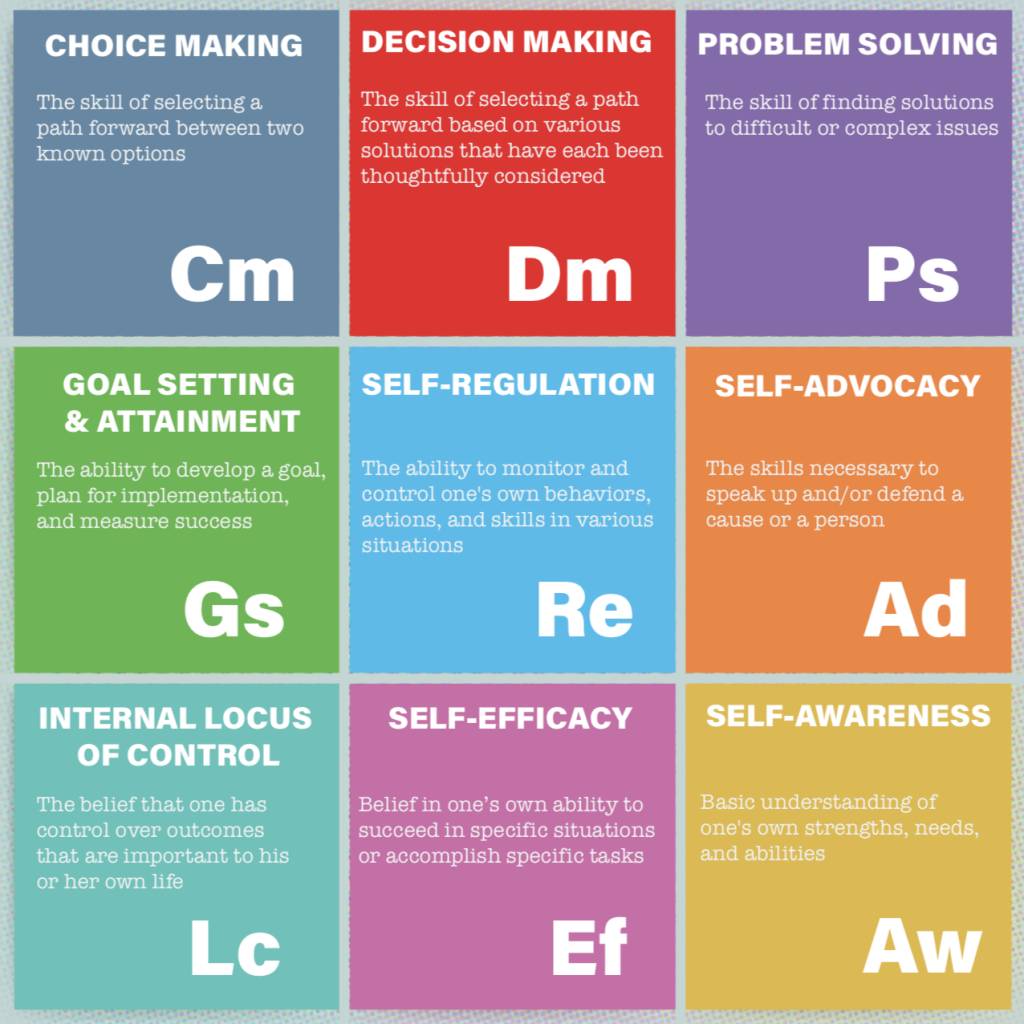Transition: Empowering Students through Self-Determination

This article originally appeared in START Connecting in February 2023.
Student Empowerment and Supported Decision Making
Student empowerment is important for all students, with and without disabilities, for achieving greater independence. It involves helping students make choices and decisions that prepare them for the transition out of high school and to adulthood. In a transition guide from the U.S. Department of Education, Office of Special Education and Rehabilitation Services (OSERS) (2020), student empowerment is identified as fundamental to improving post high school outcomes. Components of student empowerment include supported decision making; families and professionals maintaining high expectations; making informed choices; person-centered planning; and social-emotional learning.
Self-determination is a key element of Supported Decision Making (SDM). It encourages individuals with disabilities to make choices and decisions about their own lives, with the help of family, friends, advocates, and trusted others (MiDDC). As self-determination grows, so can autonomy in decision-making and knowing when to enlist the support of others.
Self-Determination
Self-determination can be defined as having the ability to act autonomously, making your own intentional choices and decisions, and taking action (Hui & Tsang, 2012). The American Association of Intellectual and Developmental Disabilities (AAIDD) further clarifies self-determination by emphasizing that all individuals, regardless of abilities, maintain the same legal rights and responsibilities. Self-determination skills can be exhibited across contexts, including at school, home, work, social and recreational settings, and in the community (e.g. health care, banking, shopping). Other self-determination skills include knowing when to disclose a disability, what supports are needed, and how and when to ask for help.
I’m Determined is a comprehensive resource with tools and supports to promote self-determination with students from early childhood through young adulthood. This website was developed through the Virginia Department of Education and includes language-friendly, diverse resources, which can be useful to educators, students, and families. It includes a behavioral skills training (BST) framework, which is compatible with teaching self-determined behavior (Leaf et al., 2015; Moates, 2019; Grob et al., 2019). BST is an empirically based intervention designed to teach skills through direct instruction, modeling, and rehearsal with feedback.
Findings in a literature review found self-determination as one of 16 evidence-based predictors of post-school success for students with disabilities and a vital part of transition planning in high school (Test et al., 2009). Moore & McNaught (2014) conducted a study on Virginia’s self-determination project and discussed the nine component skills of self-determination for becoming post-high school ready for college or employment. These are identified as Elements of Self-Determination on the I’m Determined website and include Self-Awareness, Self-Advocacy, Self-Efficacy, Self-Regulation, Choice Making, Decision Making, Problem Solving, Goal Setting, and Internal Locus of Control. On the website, there are a multitude of print, electronic, video, and application-based resources to guide students, families, and educators through each of the component areas, planning for transition, and much more. Information can be filtered by format, type, grade level, audience, and topics.
Acquiring self-determination skills takes time and is a continual process. It should begin in elementary school with choosing goals to gain increased self-advocacy and independence skills. START has recently enhanced the Home Independence Goal Ideas and School Independence Goal Ideas, dividing them by K-12 and Secondary Transition Programming and covering the skill areas of Independence, Self-Advocacy and Self-Determination, Social, Safety, Health and Sexuality, and Community. Identifying several appropriate skills from these lists may provide a place to start with a student at any age.
Image from I'm Determined
In addition to the I'm Determined website, there are other excellent websites providing assessments, curricula, and resources available to promote self-determination with elementary-age students to young adults, including:
- Michigan Developmental Disabilities Council (DDC): Supported Decision Making
- Michigan Alliance for Families: Self-Determination
- Organization for Autism Research (OAR): Self-Determination Skills for Transition
- OCALI: Self-Determination is a Key Factor
- Pacer’s National Parent Center on Transition and Employment
- Transition TN: Pathways to Self-Determination (you will need to create a free account)
- START Secondary Transition: Preparing Students with ASD for Success Online Training-Empowering Students
- Zarrow Institute on Transition and Self-Determination
All students can grow in self-determination. When planning with students and families, it is helpful to identify appropriate learning and life goals based on their needs and interests, and determine what is most suited for their development and independence. By fostering and teaching skills in key elements, we are preparing students for success both in and beyond school and providing learning opportunities that can be beneficial throughout adulthood.
Written by Stacie Rulison, M.Ed., BCBA, (Project Consultant), Lisonn Delcamp, Ed.S. (Autism Education and Intervention Specialist), and Jamie Owen-DeSchryver, Ph.D. (Project Faculty)
References
Grob, C., Lerman, D., Langlinais, C., & Villante, N. (2019). Assessing and teaching job‐related social skills to adults with autism spectrum disorder. Journal of Applied Behavior Analysis, 52(1), 150-172.
Hui, E. K., & Tsang, S. K. (2012). Self-determination as a psychological and positive youth development construct. The Scientific World Journal.
Leaf, J., Townley-Cochran, D., Taubman, M., Cihon, J., Oppenheim-Leaf, M., Kassardjian, A., Leaf, R., McEachin, J., & Pentz, T. (2015). The teaching interaction procedure and behavioral skills training for individuals diagnosed with autism spectrum disorder: A review and commentary. Review Journal of Autism and Developmental Disorders, 2, 402–413.
Moates, M. M. (2019). Effects of the self-determined learning model of instruction on goal attainment and self-determination for students with autism spectrum disorder. VCU Scholars, Virginia Commonwealth University. A dissertation submitted in partial fulfillment of the requirements of the degree of Doctor of Philosophy at Virginia Commonwealth University.
Moore, M. & McNaught, J. (2014). Virginia’s self-determination project: Assisting students with disabilities to become college and career ready. Journal of Vocational Rehabilitation, 40, 247-254.
Test, D., Fowler, C., Richter, S., White, J., Mazzotti, V., Walker, A., Kohler, P., & Kortering, L. (2009). Evidence-based practices in secondary transition. Career Development for Exceptional Individuals, 32(2), 115-128.
U.S. Department of Education (Department), Office of Special Education and Rehabilitative Services, A Transition Guide to Postsecondary Education and Employment for Students and Youth with Disabilities, Washington, D.C., 2020.

